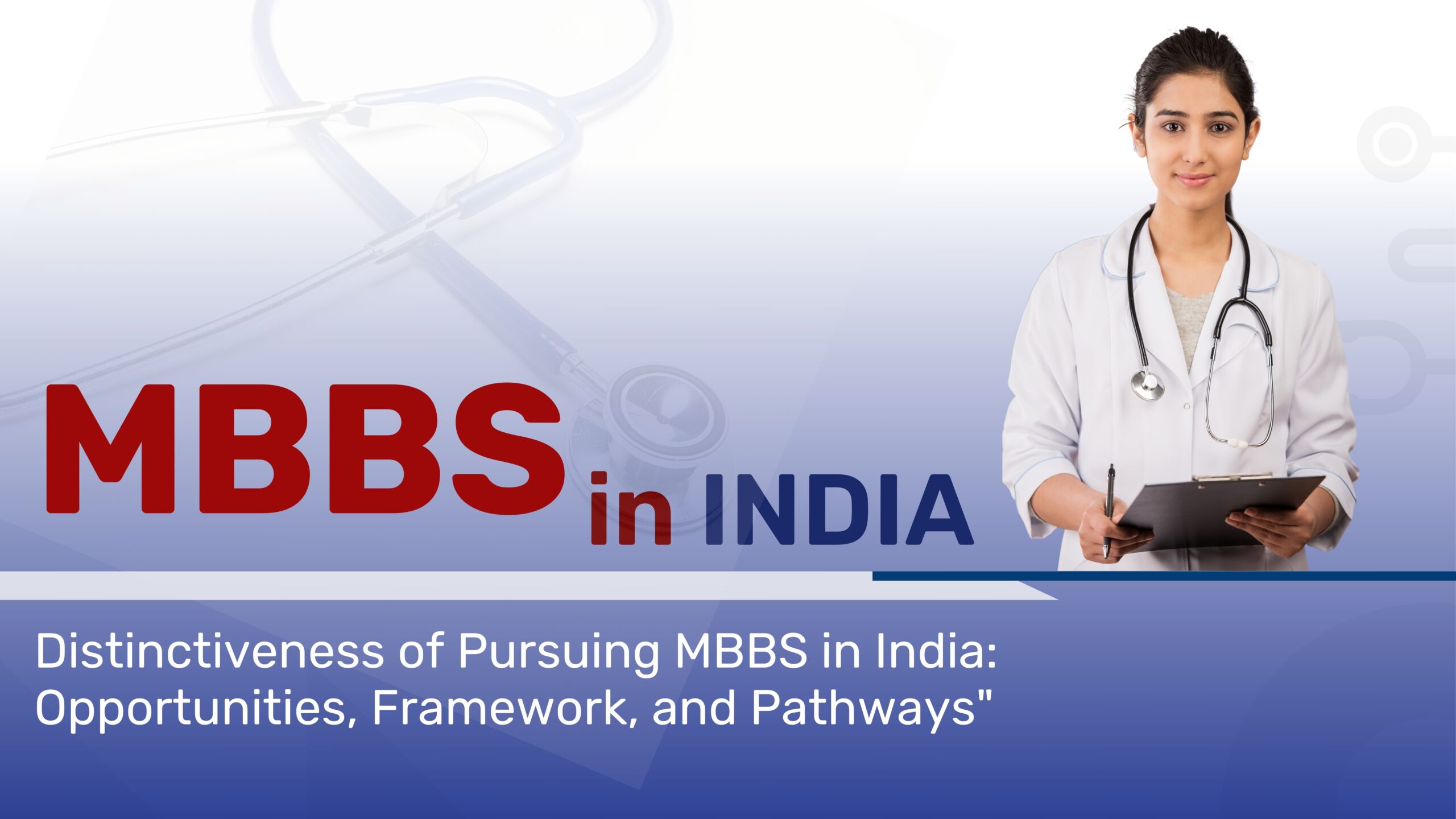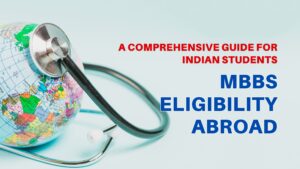The MBBS degree program in India stands out as a beacon of opportunity for aspiring medical professionals globally. With its strong educational framework, dedicated mentors, and prestigious institutions, India offers a promising path toward academic excellence in medicine. Securing admission to these programs requires passing the National Eligibility cum Entrance Test (NEET), a crucial step for aspiring medical students. The serene learning environment facilitates accelerated knowledge acquisition, ensuring students are well-prepared for the challenges of the medical field. The duration of MBBS in India spans 5.5 years, encompassing 4.5 years of rigorous classroom training and a subsequent internship period.
One of the key reasons why pursuing an MBBS degree in India is appealing is its affordability compared to many Western countries. Additionally, the country boasts a vast network of medical colleges offering a wide range of specialties, providing students with diverse learning opportunities. The rigorous curriculum, accredited by the Medical Council of India (MCI), ensures that students receive comprehensive training aligned with global standards.
Furthermore, Indian MBBS programs are recognized by esteemed organizations such as the World Health Organization (WHO), the National Medical Commission (NMC), and UNESCO, ensuring international recognition and credibility. Graduates also have the potential for international recognition through exams like the USMLE, enabling them to practice abroad.
WHY MBBS IN INDIA?
Opting for an MBBS degree in India offers numerous compelling advantages:
Affordable Tuition Fees: Compared to many Western countries, India provides MBBS education at more affordable rates.
Vast Network of Medical Colleges: India boasts a vast array of medical colleges, each offering diverse specialties, providing students with ample options for their academic pursuits.
Rigorous Curriculum Accredited by MCI: The curriculum for MBBS programs is rigorously structured and accredited by the Medical Council of India (MCI), ensuring high-quality education.
Exposure to Diverse Patient Population: Students gain exposure to a wide variety of medical conditions and patient demographics, enriching their clinical experience.
Practical Training in Government Hospitals: Opportunities for practical training in government hospitals allow students to apply their theoretical knowledge in real-world settings.
Availability of Postgraduate Medical Education: India offers numerous opportunities for postgraduate medical education, allowing students to further specialize in their chosen field.
Cultural Immersion and Understanding: Studying in India provides a unique opportunity for cultural immersion and a deeper understanding of the healthcare challenges specific to the region.
Access to Traditional Medicine Systems: Alongside modern medicine, students have access to traditional medicine systems such as Ayurveda and Yoga, providing a holistic approach to healthcare education.
Contribution to Varied Healthcare Needs: With India being a populous country with diverse healthcare requirements, students have the chance to make a meaningful contribution to addressing these needs.
Esteemed Research Initiatives and Comprehensive Training Programs: Indian MBBS programs are highly regarded for their robust research initiatives and comprehensive training programs, preparing students for successful careers in healthcare.
Exceptional Clinical Knowledge Imparted: Medical colleges in India are renowned for imparting exceptional clinical knowledge and expertise to students, ensuring they are well-prepared for practical application in healthcare settings.
Aligned with Global Standards: The syllabus followed in Indian medical colleges is aligned with global standards, ensuring that students receive a well-rounded education that meets international benchmarks.
ELIGIBILITY CRITERIA
Age Requirement: Candidates must be at least 17 years old at the time of admission and should not exceed 25 years of age.
Academic Qualifications:
- General category students must score a minimum of 50% marks in the 12th grade, with Physics, Chemistry, and Biology as primary subjects.
- Reserved category candidates must achieve a minimum of 40% marks.
- For AIIMS, the percentage requirement is higher, with 60% for general category and 45% for SC/ST and OBC candidates.
Subjects in 12th Grade: Physics, Chemistry, and Biology are compulsory subjects in the 12th grade for MBBS admission.
Entrance Exams:
- NEET (National Eligibility cum Entrance Test) is mandatory for MBBS admission in India.
- Other entrance exams include JIPMER or AIIMS entrance tests, Kerala CEE, Karnataka CET, etc.
Candidates must meet these criteria and clear the requisite entrance exams to secure admission to MBBS programs in India.
DOCUMENTS REQUIRED
Medical candidates seeking MBBS admission in India should prepare the following documents:
Mark Sheets: Valid mark sheets of class 10th and class 12th demonstrating academic performance.
NEET Scorecard: Essential for admission to MBBS programs in India, showcasing performance in the National Eligibility cum Entrance Test (NEET).
School Documents:
- Transfer certificate from the previous school.
- Code of conduct certificate.
- Medical certificate.
- Health check-up certificate.
- No criminal record certificate.
Caste Certificate: Indicating the candidate’s belonging to SC/ST/OBC category, if applicable.
Passport: A valid passport and photocopies thereof, if you are a citizen of any other country
Financial Documents: To pay the required fees during admission, if you are a citizen of any other country.
LIST OF NMC APPROVED MEDICAL COLLEGES IN INDIA
- Geetanjali Medical College
- MGM
- Sharda Medical College
- Rama Medical College Kanpur
- Rama Medical College Ghaziabad
- Subharti Medical college
- Santosh Medical college
- Dr. KNS Memorial Institute of Medical Sciences
- Muzaffar Nagar Medical College
- Saraswati Medical College
- Career Institute of Medical Sciences & Hospital
- Hind Institute of Medical Sciences
- Shri Ram Murti Simarak Medical College
- Teerthankar Medical college
- ERA’s Lucknow Medical College
- Divya Jyoti Medical College
- Adichunchanagiri Institute Medical College
- Basaveshwara Medical College
- Dr. Baba Sahib Ambedkar Medical College and Hospital
- J.J.M Medical College
- KVG Medical College and Hospital
- M.S Ramaiah Medical College
- Kempegowda Institute of Medical College
- Mahadevappa Rampure Medical College
- SDM College of Medical Sciences & College
- S S Institute of Medical Sciences and Research Centre
- Sapthagiri Institute of Medical Sciences and Research Center
- Vydehi Institute Of Medical Sciences And Research Centre
- Subbaiah Institute of Medical Sciences
- Srinivas Institute of Medical Sciences and Research Centre
- Raja Rajeswari Medical College and Hospital
- Navodaya Medical College Hospital and Research Center
- Al-Ameen Medical College
- MVJ Medical College
- Jawaharlal Nehru Medical College
- KS Hegde Medical College
- Shri B.M. Patil Medical College
- Sri Devaraj Urs Medical College
- Siddhartha Medical College
- Vinayaka Mission Medical College
- Shri Guru Ram Rai Institute of Medical and Health Sciences
- Himalayan Institute of Medical Sciences
- D.Y Patil Medical College, Pune
- D.Y Patil Medical College, Mumbai
- D.Y Patil Medical College, Kolhapur
- Bharati Vidyapeeth
- Mahatma Gandhi Mission Medical College
- Krishna Institute of Medical Sciences
- NKP Salve Institute of Medical Sciences and Research Centre
- National Institute of Medical Sciences And Research
- Terna Medical College
- Ashwani Rural Medical College
- Dr. PunjabRao Deshmukh Memorial Medical College
- Dr. Vasantrao Pawar Medical College
- Dr. Ulhas Patil Medical College And Hospital
- Annashaeb Chundaman Patil Memorial Medical College
- Jawaharlal Nehru Medical College
- L. N. Medical College And Research Centre
- Index Medical College Hospital & Research Center
- Chirayu Medical College and Hospital
- Sri Aurobindo Institute of Medical Sciences
- People’s College of Medical Sciences and Research Center
- R D Gardi Medical College
- Narayan Medical College and Hospital
- Lord Buddha Koshi Medical College and Hospital
- Katihar Medical college
- Mata Gujri Memorial Medical College
- KPC Medical College and Hospital
- Maharishi Markandeshwar Institute of Medical Sciences and Research
- Sri Guru Gobind Singh Tricentenary Medical College
Challenges
Challenges in Pursuing an MBBS Degree in India:
High Competition: The limited number of seats in medical colleges results in intense competition, leading to high-pressure entrance exams and stress among aspiring students.
Infrastructure Deficiencies: Some medical colleges may lack adequate infrastructure and resources, impacting the quality of education and clinical training provided to students.
Bureaucratic Processes: Lengthy bureaucratic processes and administrative hurdles within the medical education system can impede the smooth academic progression of students.
Overcrowded Clinical Settings: Overcrowded hospitals and clinics may hinder individualized attention and hands-on learning experiences during clinical rotations for students.
Language Barrier: Non-native speakers of regional languages may face communication challenges with patients and colleagues during clinical training, affecting their learning experience.
Limited Specialization Options: The availability of specialized residency programs in certain medical fields may be limited, restricting career options and opportunities for advanced training for students.
Workload and Stress: The demanding curriculum, heavy workload, and long hours of study and clinical duties can contribute to high levels of stress and burnout among medical students, impacting their overall well-being.
Limited Financial Aid: Limited availability of financial aid and scholarships further exacerbates the financial burden on students, particularly those from disadvantaged socioeconomic backgrounds.
High Tuition Fees in Private Medical Institutes: The high cost of tuition fees for medical education can be a significant barrier for students from low-income backgrounds, making it challenging for them to afford a medical education.
Financial Strain: The financial strain of pursuing a medical education can lead to additional stress and pressure on students, impacting their academic performance and overall well-being.
Impact on Diversity: Socioeconomic barriers may contribute to a lack of diversity within the medical profession, as students from underprivileged backgrounds may be deterred from pursuing a career in medicine due to financial constraints.
However, pursuing an MBBS degree in India offers an enriching and affordable pathway to medical excellence. With a robust educational framework, diverse patient exposure, and accreditation from esteemed organizations, it stands as a beacon of opportunity for aspiring medical professionals worldwide. From rigorous classroom training to practical internships in government hospitals, the journey fosters both academic rigor and cultural immersion. By meeting stringent eligibility criteria and clearing entrance exams, students embark on a transformative journey towards a fulfilling career in healthcare, poised to make impactful contributions globally.








